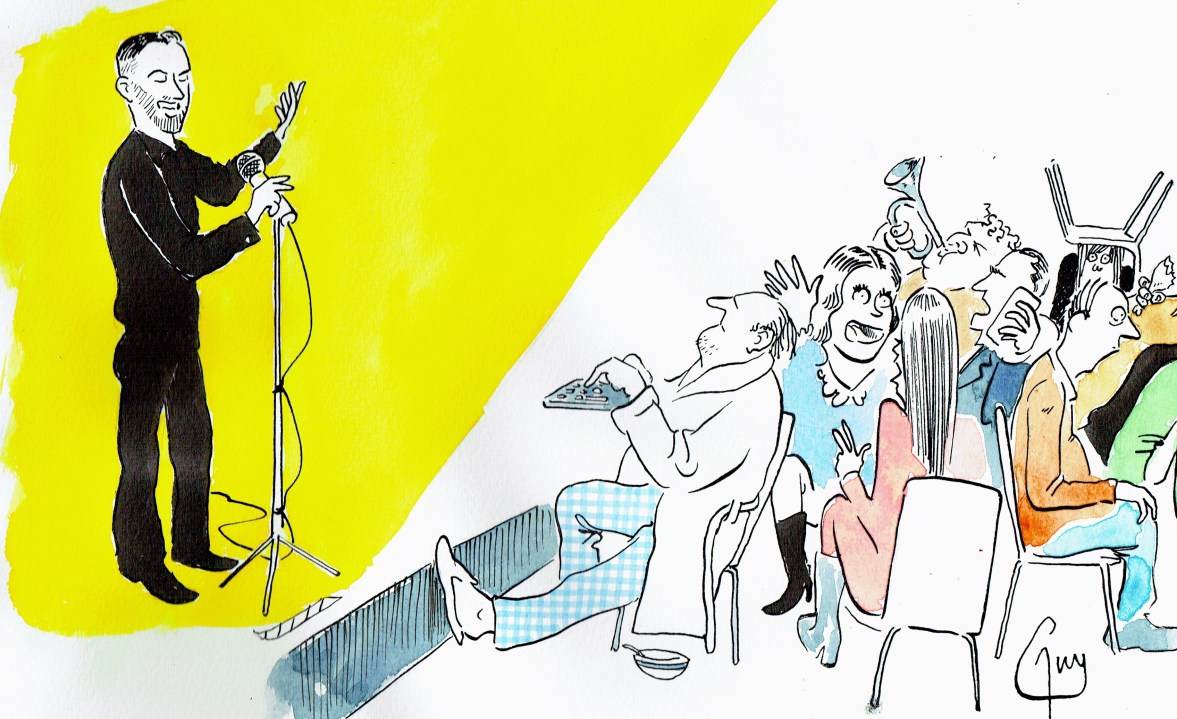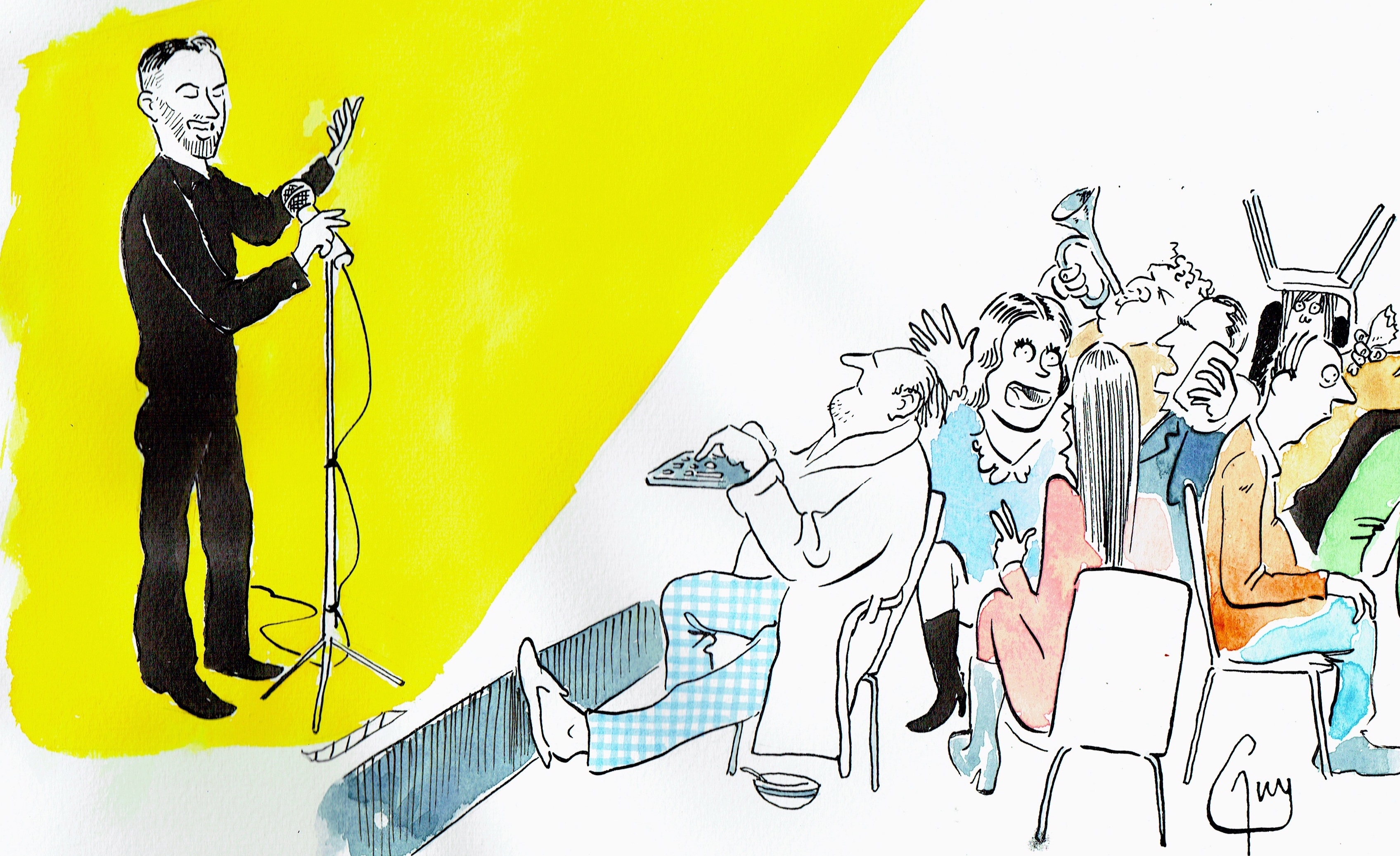In a recent preview of this year’s diet Edinburgh Fringe a local reporter wondered aloud why so many stand-ups were doing shows as a work in progress. I, along with numerous comics, let him have it, self-righteously pointing out that most of our gigs since March 2020 have been staring at a Macbook. Or outdoors shouting punchlines to someone ten metres away asleep on a deckchair.
It takes a while to get your confidence back when you have flashbacks of gigging downstairs in your house to a webcam with a make-shift mic-stand and knock-off lighting. A low point came when a neighbour walked past my window and momentarily locked eyes with me.
I saw the pity and confusion as he had no idea what zoom gigs were, and probably assumed that, short of money during the Pandemic, I had loaded up the webcam and started an ill-conceived account with OnlyFans.
However, real gigs are back, and as I prepare to go out touring in September there have already been some choppy waters to navigate.
People want a safe way to laugh at these things without being accused of being something phobic.
One of the first challenges is that many punters aren’t yet match-fit. Their binge-drinking during the pandemic was always tempered by the fact they could sleep where they fell and no-one would call the police or urinate on them.
However, back in the real world quite a few don’t seem to remember that once you get outside your lounge, not everyone appreciates you shrieking over a punchline. And it turns out sadly you can’t mute humans in real life (unless they talk about something ‘problematic’ on campus).
At the risk of getting in trouble I would say women present more of a problem at live gigs. This might seem like dodgy ground, but I’d wager even my most feminist colleagues might recognize this as a specific issue in comedy clubs. I’m going to throw cancellation caution to the wind and say it: women in large groups are fairly fond of a chat. Women undoubtedly get talked over in meetings. Maybe it’s because they’ve saved up all their interrupting energy for midway between my set ups and punchlines. They’re also very not fond of being told to shut up by some jester holding a microphone who looks less like a comic and more like an electrician.
On one of my first big gigs back in Western Super Mare a group of women who worked as carers were on their night out. Their profession had been discussed by the compere early in the show. I winced, knowing that, jacked up on Zinfandel and moral certainty, they could become a handful. And so they were, interrupting the show constantly to try and drag the focus back to them, in the hope they could bask in more approval. I was less indulgent. Looking back I probably shouldn’t have exacerbated things by openly wishing for a devastating and sudden third wave of Covid to end the gig early, but I was running short on patience and couldn’t remember any standard put-downs.
One thing many comics are reporting is laughter – lots of it. Having missed the buzz of live comedy audiences are very giving. It makes a nice change having performed amid the paltry methadone of a zoom gig, where you’re eagerly scanning tiny videos for signs of shoulders moving slightly. Before long they’ll remember the tropes, and realise all of us are essentially doing the same Tinder joke, only worded differently, but for now it feels like finding out your electricity bill has somehow run into credit.
There are some new comedic genres to navigate too. Observational comedy thrives on shared experience. The pandemic, and in particular the vaccine, is something more or less all adults have experience of. However, it’s worth checking what the other comics have said before you go on. I suspect audiences will soon groan as hard at jokes about Pfizer and erections as they do about the hilarious fact that Boris Johnson has lots of kids.
Despite these new normals, I’ve loved being back on stage. It’s fair to say that, in the long hiatus between live gigs, the jeopardy of writing and saying things in the public domain has gone up. Stand-up, however, has somehow escaped the worst of this censoriousness. In an actual room with real people and armed with intonation you can still say more or less anything if it has something resembling a punchline.
At a tour preview in Bristol the gig was going through a lean spell. With a spate of athletes having recently withdrawing from competition I flippantly said, ‘Maybe I should withdraw to focus on my mental health’. The audience knew from the way I said it that it didn’t mean I had no empathy whatsoever for mental health, I was just momentarily indulging my mischievous side to get out of a tight spot. A ‘joke’ was what we used to call it the live version of such things. No one started a petition. No-one wrote a Guardian article. No-one selectively cropped a clip and said ‘Right wing comedy? No thanks.’
As you stand on stage bouncing off social issues and faddy cultural fault-lines you realise that most people aren’t furious in the way we’re led to believe. They’re confused sometimes, bewildered others, mildly irritated or just plain bored and want a safe way to laugh at these things without being accused of being something phobic. And I’m more than happy to oblige – unless I’m getting stared out by some health workers in Western Super Mare.
Geoff Norcott is touring the UK from September with his new show ‘I Blame The Parents’







Comments